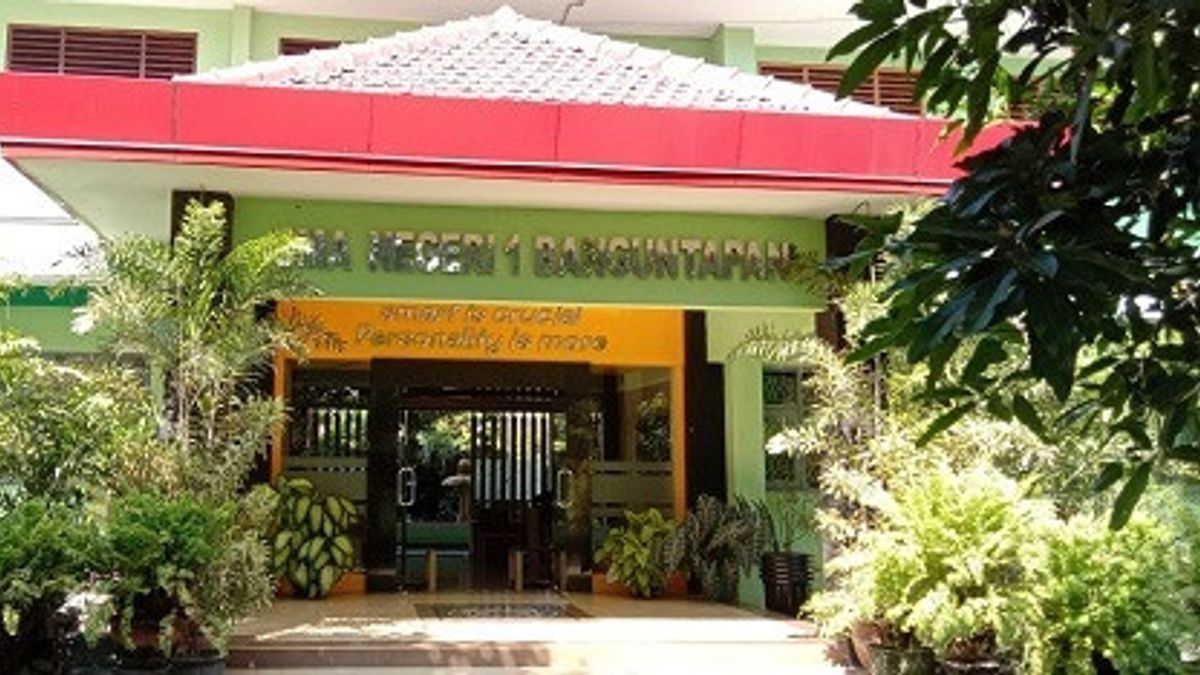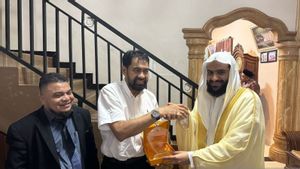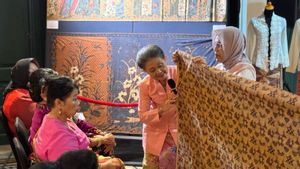JAKARTA - HA's worries arose when her son called. Only the sound of crying, without a word was heard. After the phone was closed, a WhatsApp message came in, again from his son. HA's concern is getting bigger, especially when reading the contents of the message.
"Mom, I want to go home, I don't want to be here," said HA telling what his daughter was going through on July 26, 2022, after undergoing the School Environment Introduction Period (MPLS) at SMAN 1 Banguntapan, Bantul, Yogyakarta Special Region.
Almost simultaneously, HA's husband informed that his son had been in the bathroom for more than an hour. HA immediately rushed to the school and found her child in the School Health Unit room. The child immediately hugged HA while crying.
"He didn't say anything, he just cried," continued HA.
He was even more upset when he found out what happened to his son. "My son was forced to wear a headscarf."
According to HA, it is not true that public schools force their students to wear headscarves, especially to the point of making students depressed. Schools should respect students' choices. "I don't just keep asking why I don't want to wear the hijab."
“I am a woman who happens to wear a headscarf, but I respect my son's decisions and principles. I think every woman has the right to determine her own clothing model," added HA.

HA admitted that his son was traumatized and had to receive psychological assistance as a result of the incident.
What made HA even more angry was that a teacher accused his son of not wanting to wear the hijab because of family problems.
"Many people have their own challenges. Bullying teachers threaten my child, I want to ask, 'What problems did you have in your family that made my child a target? Would you mind if I asked you back like this?" said HA.
Knowing this, the Deputy Head of the Yogyakarta Special Region Education, Youth and Sports (Disdikpora) Office, Suhirman immediately called the Principal of SMAN 1 Banguntapan Agung Istiyanto along with BK teachers, religion teachers, and homeroom teachers.
From the guidance and counseling teacher's explanation, what he did was just to set an example, teach him how to wear a headscarf. "So, there is no coercion," said Suhirman.
Agung also said that it was only a tutorial. “Because when asked that he had never worn a headscarf, then the teacher said what if we did a tutorial, he answered nodding (by a student). The BK teacher then looked for the hijab in his room because there were examples. Then, the teacher said what if we set an example? The student answered that it was okay and the students nodded yes,"
Although it is still only a guess, Sultan Hamengku Buwono X immediately took decisive steps by deactivating the Principal and 3 teachers of SMAN 1 Banguntapan. Cannot teach until there is certainty.
As for the use of the hijab for students, the rules are clear. "You can't force it, you can't prohibit it. It's okay to wear the hijab, but don't force it," Sultan said, as quoted by VOI.
KPAI Hands DownSo far, the Indonesian Child Protection Commission (KPAI) and the Inspectorate General of the Ministry of Education and Culture Research and Technology (Intjen Kemendikbudristek) continue to work together to deal with the alleged case of forced veiling at SMAN 1 Banguntapan.
KPAI has made observations and asked for information from a number of parties. On the first day, said KPAI Commissioner Retno Listyarti, KPAI had met and asked for information regarding the chronology of the forced veiling of the victim's father.
"Apparently, this has happened several times. On July 18, 20, 25 and 26, 2022," Retno said to VOI, Wednesday (3/8).
From the psychological assessment of the victim after the incident, it was briefly known that the victim had suffered a psychological blow. He was depressed and had to lock himself in his room for several days until finally the victim was persuaded and convinced to leave the room and meet his companion.
KPAI together with the Investigative Team of the Ministry of Education and Culture, Research and Technology also sought information from the victim's mother who always chatted and communicated verbally with the victim's child.
"The victim's mother's statement is supported by recordings of chats with the victim's child, ranging from the victim participating in the MPLS until the incident on July 26, 2022, when the victim's mother took her child to school because she kept crying and had time to lock herself in the school toilet. This means that there is a relationship between the events experienced by the victim at school and the psychological condition of the victim," said Retno.

On the second day, KPAI and the Inspectorate General of the Ministry of Education and Culture, Research and Technology dug up chronological information from the school.
"Essentially, the BK teacher and homeroom teacher admitted that there was an incident of putting a headscarf on the victim's child in the BK room, but the excuse was only as a tutorial," explained Retno.
KPAI and the Investigative Team of the Ministry of Education and Culture, Research and Technology also had time to tour the classrooms and see the locations of incidents such as the UKS, toilets, BK rooms, gazebos and school canteens. All locations in the story of the victim, his parents and also the teachers involved.
“When I entered the school area, I saw students who were exercising, and all of the women were wearing headscarves. When entering the two classes, all the girls were wearing headscarves, as was when they walked around the school and greeted the students. According to the headmaster's statement, it is true that Muslim students at the school wear headscarves, although it is not mandatory for schools to wear headscarves," said Retno.
"KPAI and the Inspectorate General of the Ministry of Education and Culture, Research and Technology will continue to oversee this case, and all monitoring results will be used as a basis for issuing recommendations on the case," said Retno.
Regarding the use of religious attributes in the school environment, Permendikbud Number 45 of 2014 concerning School Uniforms for Students at the Elementary and Secondary Education Levels has provided clear directions.
Every student may use religious attributes at school. Schools may not require or prohibit it.
"School uniforms are regulated by each school while taking into account the right of every citizen to practice their respective religious beliefs," reads Article 3 paragraph 4 point d.
Drama Rules of HijabRules for the use of the hijab in Indonesia can be considered 'dramatic'. The New Order government had banned it around the 1970s. No school student is allowed to wear a headscarf to school.
The rules changed around the 1990s and lasted until the New Order's transition to post-reformation.
"More freedom, you can wear short uniforms, you can long, you can wear a scarf. This is what was later formulated by the Ministry of Education and Culture in Permendikbud Number 45 of 2014," said the Coordinator of the Education and Teacher Association (P2G) Satriwan Salim as quoted by the BBC, Monday (1/8).
Then, the three ministers reaffirmed the rules for the use of headscarves in public schools through a Joint Decree (SKB). Minister of Education and Culture Nadiem Makarim, Minister of Home Affairs Tito Karnavian, and Minister of Religion Yaqut Cholil Qoumas signed the joint regulation.

“School institutions may no longer require students and education staff to wear uniforms with certain religious attributes. Whatever religion it is. The use of school uniforms with religious attributes in public schools is the decision of students and teachers as individuals," Nadiem told reporters during the online signing of the Three Ministers' Joint Decree (SKB) in Jakarta on February 3, 2021.
However, only 3 months later, the Supreme Court canceled the SKB. The Supreme Court stated that the Ministerial Decree 3 regarding school uniforms contradicted Article 1 point 1 and number 2, Article 3 and Article 12 Paragraph 1 letter a of Law 20/2003 concerning the National Education System.
Then Article 1 point 1 and Article 1 number 2 of Law 12/2011 concerning the Establishment of Legislation. Furthermore, it is contrary to Article 1 number 1 of Law 35/2014 concerning Child Protection. And finally, it contradicts Article 10, Article 11 and Article 12 of Law 23/2014 concerning Regional Government.
With the cancellation, the use of headscarves in schools is adjusted to the rules of each school and the cultural customs of the area where the school is located.
For example in West Sumatra. As expressed by Sayuti from the Minangkabau Natural Density Institute reported by the BBC.
“Here, the matrilineal system has existed for a long time. The Minangkabau people are taught by their parents, ninik mamak, for men wearing a cap and wearing a sarong, for women wearing brackets and a headscarf. All of that covers aurat, it's not Islam, but local wisdom and local wisdom are protected by law," Sayuti said.
The English, Chinese, Japanese, Arabic, and French versions are automatically generated by the AI. So there may still be inaccuracies in translating, please always see Indonesian as our main language. (system supported by DigitalSiber.id)









